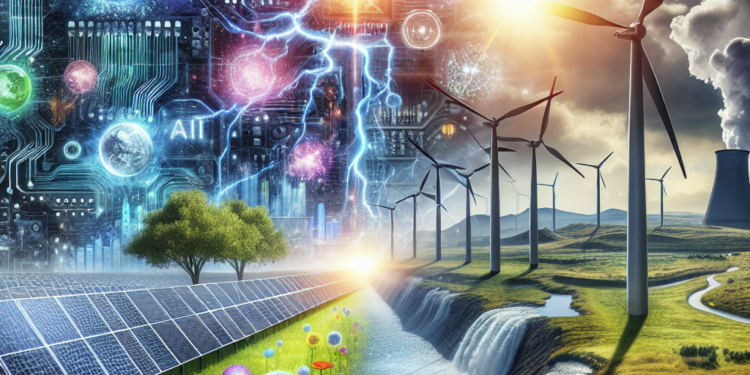Artificial intelligence (AI) has become a game changer in the field of renewable energy forecasting. With the increasing need for clean energy sources and the growing trend towards sustainable development, accurate forecasting of renewable energy generation has become crucial for efficient energy management. AI technologies such as machine learning, neural networks, and deep learning are revolutionizing the way energy systems are managed and optimized, leading to significant improvements in renewable energy forecasting.
One of the biggest challenges in renewable energy forecasting has been the variability and unpredictability of renewable energy sources such as solar and wind. Traditional forecasting methods have often struggled to accurately predict energy generation from renewables, leading to inefficiencies in energy production and distribution. AI technologies offer a solution to this problem by enabling real-time analysis of large volumes of data from weather patterns, energy generation sources, and historical data to predict future energy generation more accurately.
Machine learning algorithms, in particular, have shown great potential in improving the accuracy of renewable energy forecasting. These algorithms can analyze vast amounts of data and identify patterns and trends that human operators may overlook. By continuously learning from new data and adjusting their predictions accordingly, machine learning algorithms can provide more accurate and reliable forecasts of renewable energy generation.
Neural networks, another AI technology, have also been used to improve renewable energy forecasting. These networks are designed to mimic the way the human brain processes information, allowing them to learn and adapt to new data in a way that traditional forecasting methods cannot. By training neural networks on historical energy generation data and weather patterns, researchers have been able to develop models that can predict energy generation from renewable sources with greater accuracy and reliability.
Deep learning, a subset of machine learning that utilizes multiple layers of neural networks, has shown even greater potential in renewable energy forecasting. Deep learning algorithms can process large amounts of complex data and identify intricate patterns and relationships that can be used to make more accurate predictions. By training deep learning models on historical energy generation data, weather forecasts, and other relevant data sources, researchers have been able to achieve significant improvements in the accuracy of renewable energy forecasting.
One of the key advantages of AI technologies in renewable energy forecasting is their ability to adapt to changing conditions in real-time. As weather patterns shift and energy generation sources fluctuate, AI algorithms can adjust their predictions quickly and effectively, ensuring that energy systems can respond to changes in renewable energy generation with minimal disruption. This real-time adaptability is essential for managing the variability of renewable energy sources and optimizing energy production and distribution efficiently.
AI technologies have also been used to improve the integration of renewable energy sources into existing energy systems. By accurately forecasting energy generation from renewables, AI algorithms can help grid operators balance supply and demand, reduce energy costs, and minimize carbon emissions. AI technologies can also optimize energy storage systems, helping to store excess energy generated from renewables during times of low demand and releasing it when demand is high, improving overall energy system efficiency.
In addition to improving the accuracy and reliability of renewable energy forecasting, AI technologies can also help optimize energy production from renewables. By using AI algorithms to analyze real-time data from energy generation sources, weather patterns, and energy consumption patterns, operators can adjust energy production levels to meet demand more effectively, reducing energy wastage and maximizing the use of renewable energy sources.
Furthermore, AI technologies can help enhance the cybersecurity of energy systems by detecting and responding to potential threats and vulnerabilities in real-time. By continuously monitoring energy systems for anomalous behavior and identifying potential cyberattacks, AI algorithms can help prevent disruptions to energy generation and distribution, ensuring the security and reliability of renewable energy systems.
Overall, AI advances in renewable energy forecasting are transforming the way energy systems are managed and optimized. By harnessing the power of machine learning, neural networks, and deep learning, researchers and operators are able to make more accurate predictions of renewable energy generation, optimize energy production and distribution, improve energy system efficiency, and enhance cybersecurity. With the growing demand for clean energy sources and the need for sustainable development, AI technologies are set to play a crucial role in driving the transition to a more renewable energy future.













